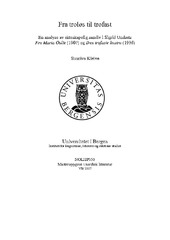| dc.contributor.author | Kleive, Sunniva | |
| dc.date.accessioned | 2017-09-04T11:07:42Z | |
| dc.date.available | 2017-09-04T11:07:42Z | |
| dc.date.issued | 2017-06-10 | |
| dc.date.submitted | 2017-06-09T22:00:07Z | |
| dc.identifier.uri | https://hdl.handle.net/1956/16529 | |
| dc.description.abstract | Denne masteroppgaven tar for seg Sigrid Undsets debutroman Fru Marta Oulie (1907) og hennes siste samtidsroman Den trofaste hustru (1936). Begge romanene handler eksplisitt om ekteskap og spørsmål knyttet til samliv med og oppdragelse av barn. I Fru Marta Oulie er kvinnen utro mot ektemannen, mens mannen er utro i Den trofaste hustru. Utviklingen i forfatterskapet er interessant, og kan tyde på at Undset i flere omganger ville undersøke hva det vil si å være troløs og trofast i et ekteskap. Hvordan skrives det å være trofast frem i romanene? Er Marta og Nathalie trofast på forskjellige måter? I avhandlingen min blir trofastbegrepet bærende, og blir knyttet til kvinnesynet i Undsets samtid. På den ene siden fikk kvinner i begynnelsen av 1900-tallet nye friheter, og gamle kvinneidealer ble utfordret av nye. Samtidig ble det forventet at kvinner skulle innfri de gamle idealene. Hvordan kunne kvinnene forene det å være trofast mot rollen som mor, kone, eller som den selvstendige og moderne kvinnen? Jeg har argumentert for at kvinnerollene brakte med seg en taushet. I Fru Marta Oulie kan ikke kvinnen snakke om utroskapen, ettersom hennes rolle som elskerinne strider mot rollen som kone. Derimot streber kvinnen i Den trofaste hustru med å oppfylle alle kvinnerollene samtidig. Det resulterer i at hun ikke lytter til sine egne ønsker og behov. Det er min oppfatning at kvinnene i starten knytter trofastbegrepet til å være seksuelt trofast. Av den grunn bruker ikke kvinnene språket, og ektefellene blir fremmed for hverandre. Trofastbegrepet henger altså sammen med kvinnenes forståelse av ekteskapet. Min konklusjon er at Undset skriver frem behovet for både sosial og seksuell kontakt i et ekteskap i Fru Marta Oulie og Den trofaste hustru. Dette har jeg argumentert for ved å blant annet bruke Stanley Cavell sin dagligspråksfilosofi for å undersøke samtalene i romanene. Han presenterer to filmsjangrer som han kaller for ”gjengiftekomedie” og den ukjente kvinnens melodrama”. I filmsjangrene viser han at samtale mellom mann og kvinne er vesentlig i et ekteskap, noe som bekreftes av Undsets romaner. | en_US |
| dc.description.abstract | This master’s thesis examines Sigrid Undset’s first novel Fru Marta Oulie (1907), and her latest contemporary novel Den trofaste hustru (1936). Both novels are explicitly dealing with marriage and question related to marital cohabitation and the raising of children. In Fru Marta Oulie, the woman is unfaithful to her husband while the husband is unfaithful in Den trofaste hustru. This development in the authorship is interesting as it shows that Undset on several occasions wanted to examine what it means to be faithless and faithful in marriage. How is the term faithful expressed in the novels? Are Marta and Nathalie faithful in different ways? The term faithful is hence of material importance throughout this thesis. It is also linked to the view of women that applied on Undset’s time. On one hand, women gained new freedoms during the early 1900s and the old women's ideals were challenged by new ones. At the other hand, women were expected to meet the old ideals. How could women unite faithfulness to the role of mother, wife, or as the independent and modern woman? I have asserted that women's roles brought silence. In Fru Marta Oulie, the woman cannot talk about unfaithfulness, as her role as a lover is contrary to the role as a wife. On the other hand, the woman in Den trofaste hustru is doing her outmost to fulfill all women's roles. As a result, she does not listen to and depress her own wishes and needs. I hold the opinion that women initially relate the term faithful to being sexually faithful in marriage. As a result, the women do not use the language, and the spouses become strangers to each other. The term faithful thus relates to the women's understanding of marriage. My conclusion is that Undset in Fru Marta Oulie and the Den trofaste hustru address the need for both social and sexual contact in marriage. This assertion is made by applying Stanley Cavell's ordinary language philosophy to investigate the conversations of the novels. Cavell presents two movie genres, which he defines as "remarriage comedy" and “the melodrama of the unknown woman”. As confirmed by Undset’s novels, Cavell’s movie genres illustrates that the conversation between man and woman is essential in marriage. | en_US |
| dc.language.iso | nob | eng |
| dc.publisher | The University of Bergen | eng |
| dc.subject | Norsk litteratur | |
| dc.subject | Tekstanalyse | |
| dc.subject | Stanley Cavell | eng |
| dc.subject | Utroskap | eng |
| dc.subject | Ekteskap | eng |
| dc.subject | Dagligspråksfilosofi | eng |
| dc.subject | Sigrid Undset | eng |
| dc.title | Fra troløs til trofast. En analyse av ekteskapelig samliv i Sigrid Undsets Fru Marta Oulie (1907) og Den trofaste hustru (1936) | eng |
| dc.title.alternative | From faithless to faithful. An Analysis of Marital Cohabitation in Sigrid Undset’s Fru Marta Oulie (1907) and Den trofaste hustru (1936) | eng |
| dc.title.alternative | From faithless to faithful. An Analysis of Marital Cohabitation in Sigrid Undset¿s Fru Marta Oulie (1907) and Den trofaste hustru (1936) | eng |
| dc.type | Master thesis | |
| dc.date.updated | 2017-06-09T22:00:07Z | |
| dc.rights.holder | Copyright the author. All rights reserved | eng |
| dc.description.degree | Mastergradsoppgave i nordisk | |
| dc.description.localcode | NOLISP350 | |
| dc.subject.nus | 711123 | eng |
| fs.subjectcode | NOLISP350 | |
| fs.unitcode | 11-21-00 | |
